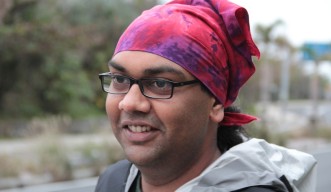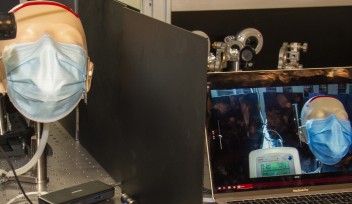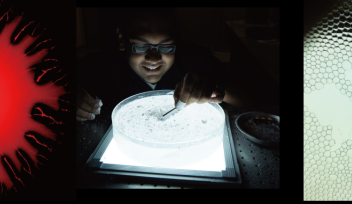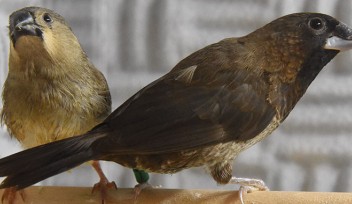OIST Physicist Receives HFSP Grant
An international collaborative proposal by OIST researcher Mahesh Bandi has won him and his colleagues a Young Investigators Grant from The Human Frontiers Science Program (HFSP). Each year for three years they will receive $350,000 to support their investigation into the role of arches in providing gait stability in the human foot, and their evolution in the fossil record.
Fossil records reveal the foot has undergone structural changes from early hominids to their present form says Bandi, so measuring the biomechanics of the feet helps scientists understand how bipedalism evolved. As a condensed matter physicist he will construct a photoelastic device to capture the forces of the foot, and build replicas of human, chimpanzee, and ancestral feet. Leading the team is Dr. Madhusudhan Venkadesan, a biomechanician from the National Centre for Biological Sciences in India who will develop the running track where the experiment will take place, and provide the fossil foot data. Dr. Shreyas Mandre, an applied mathematician at Brown University in the United States, will develop the algorithms to tease out the force values from the photoelastic device that will be integrated into the running track.
“We aim to develop techniques to answer fundamental questions in science which also find useful societal applications, such as prosthetics,” said Bandi.
The idea formed during a lunch conversation about biomechanics when Bandi traveled to Venkadesan’s institute as an invited speaker in early 2012. Bandi piqued the interest of Mandre while visiting Brown University. All three had recently moved into assistant professor positions.
“This is a shot in the arm for us youngsters,” said Bandi. “Together we had an idea in a field beyond our traditional expertise and HFSP gave us an opportunity to chase it.”
The HFSP grant looks for proposals from candidates who have not worked together, include at least one non-life scientist, and work in different countries and disciplines. In addition, the agency encourages high-risk research. From 700 initial Letters of Intent, 94 were invited to submit final applications, of which a third were for Young Investigator Awards. Bandi’s group ranked third in that final selection, and earned an award along with just nine others.
“In essence, this funding agency embodies what we want to do at OIST,” said Bandi.
All three will travel to Strasbourg, France for the annual HFSP awardees meeting in early July.
For press enquiries:
Press Inquiry Form
















